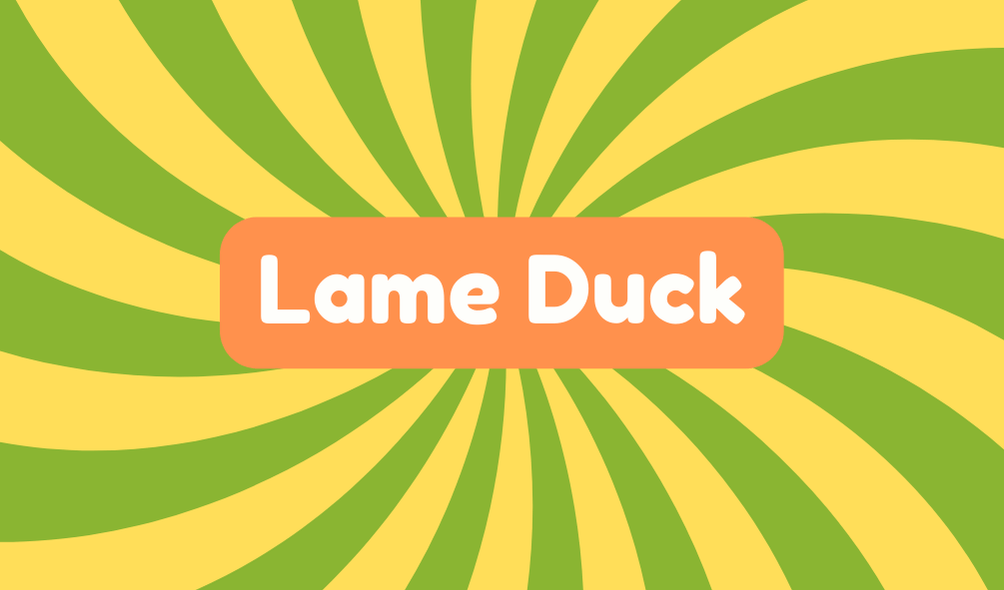A "lame duck" refers to a leader, often a politician, who has lost influence and power, typically towards the end of their term. The term originated between 1755 and 1765, initially describing failing stockbrokers before evolving to signify politicians unable to enact meaningful change. For example, a "lame duck president" might struggle to push through legislation during their final days in office. Although their authority is diminished, these officials can still impact decisions and policies. Understanding this concept is vital as it highlights dynamics in political effectiveness. If you're curious, there's more to uncover about this fascinating term.
Synonyms
When discussing the term "lame duck," you might come across several synonyms that capture its essence. These words reflect the frustrations surrounding ineffective leaders who often find themselves grappling with political powerlessness.
- Powerless
- Incapable
- Ineffective
- Disempowered
- Impotent
Each synonym depicts a situation where leadership lacks influence, sparking emotions ranging from frustration to concern. You might feel a sense of urgency, recognizing how these terms highlight the struggles of those in positions that ought to inspire but often fail to deliver. It's vital to acknowledge the implications of such leadership, as it directly impacts political agendas and public trust. Empowered leaders can create real change, while those labeled as "lame ducks" often watch opportunity slip away, leaving many yearning for something more.
Example of Sentences
To illustrate the concept of a "lame duck," consider these example sentences that capture the term's essence in various contexts. They're crafted to convey the weight of this situation:
- The outgoing senator felt like a lame duck, knowing his influence was fading.
- Many voters feared limited progress due to a lame-duck administration.
- The council's discussions were sluggish, hindered by a lame duck's indecision.
- Once the election results were in, the candidate's chances of change seemed to evaporate, leaving him a lame duck.
- A business leader can become a lame duck if they lose the support of key stakeholders.
These sentence variations provide contextual examples that underscore the often frustrating reality of being deemed ineffective or powerless.
Origin
The concept of "lame duck" has a rich history, evolving from its financial origins to its political implications. Originally coined between 1755 and 1765, the term referred to stockbrokers who failed to meet their debts. As the years passed, its meaning shifted—by the 1860s, it became associated with politicians nearing the end of their terms. This historical evolution highlights how individuals lose influence as they focus on their successors instead of impactful governance. While "lame duck" once painted a grim picture of financial failure, it now symbolizes political impotence. Understanding this shift helps you grasp how power dynamics affect leadership effectiveness, encouraging a critical approach to evaluating elected officials during their final moments in office.
Collocations
Collocations related to "lame duck" often underscore its implications in political discourse. You'll frequently encounter terms like:
- lame duck president, signifying diminished authority.
- lame duck negotiations, highlighting ineffective discussions.
- lame duck legislation, reflecting stalled initiatives.
- lame duck session, where little progress is made.
- lame duck period, indicating time wasted before a shift.
These phrases capture a frustrating reality where decisions lack impact. When political leaders engage in lame duck legislation, they often appear disconnected from urgent issues. Similarly, lame duck negotiations tend to fizzle, leaving vital discussions unresolved. This lack of effectiveness raises questions about accountability and the future direction of governance. Embracing innovative solutions can mitigate the pitfalls of this scenario, ensuring progress even under difficult circumstances.
How to Use in Everyday Language
Understanding how to incorporate "lame duck" into everyday language can enhance communication, especially regarding political discussions. You might use the phrase when talking about an outgoing official who isn't making significant changes. For example, you could say, "The senator's a lame duck, so don't expect any new initiatives." This contextual usage helps convey your skepticism about their effectiveness. In informal conversations, it's fitting to say things like "She's just a lame duck now that the election's over," making your point clear. Remember, it's not just politicians who can be labeled as lame ducks; businesses or teams facing crises can also fit the bill. Using your vocabulary wisely can sharpen your arguments and keep discussions relevant.
Why Is It Still Relevant Today?
In today's rapidly changing political landscape, the concept of a "lame duck" remains highly relevant, as it sheds light on the dynamics of power and influence within government. It's essential to recognize how lame duck officials can impact legislation and public policy, even when their electoral significance is waning. During their final days in office, these leaders often have limited influence but can still shape the political impact in unexpected ways. By analyzing this phenomenon, you gain insight into how the political arena operates, revealing vulnerabilities and power shifts. As we navigate elections, understanding the implications of lame duck periods can help you critically assess candidates and their potential effectiveness, arming you with knowledge to engage in informed discussions.







